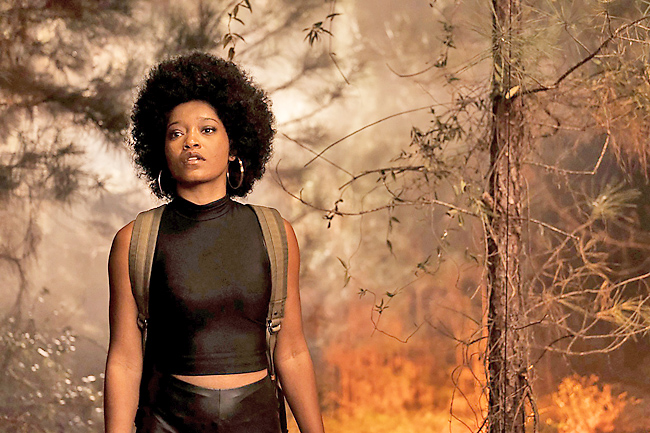Pat Padua
THE WASHINGTON POST – Imagine that an enslaved woman – in what appears to be the rural, pre-Civil War South – has escaped from bondage, and somehow emerges in the 20th Century. That’s the high concept, very loosely inspired by true events, of writer-director Krystin Ver Linden’s first feature, Alice.
Unfortunately, this promising gambit only goes so far. Despite its potentially harrowing subject, and a strong central performance, this oddly restrained film seldom breaks free from mediocrity.
The film begins on a Georgia plantation, where Alice (Keke Palmer) and her family are enslaved by a man named Paul (an unrecognisable Jonny Lee Miller), a sickly patriarch who viciously punishes the people he refers to as “domestics” and “livestock.” After Paul kills Alice’s husband Joseph (Gaius Charles) during Joseph’s escape attempt, Alice makes her own move – and during her successful flight, finds herself on a busy highway, where she gets picked up by a trucker named Frank (Common, who with Palmer also takes on the role of executive producer). Alice screams at the sight of Frank and the truck and the speeding traffic, but she remains fairly calm when he tells her the most frightening news: The year is 1973.
The name Alice echoes Lewis Carroll’s iconic heroine, lost in a world whose rules and freedoms she finds thoroughly perplexing. And, for this Alice, the 1970s are a strange wonderland. She marvels that the Black people she meets are free; watching a five-inch television set with Frank, she asks if the personalities on the sitcom Sanford and Son are “small people”.
Palmer makes for a compelling presence as she charts Alice’s arc from innocence to experience. Once Alice learns about history, and where she is, she gains confidence, and it’s a thrill to see Alice come into focus as she develops. And Ver Linden’s rendering of plantation life seems spot-on, thanks to strong performances from Charles and Miller. Alex Disenhof’s cinematography turns the film’s initial setting – a former Savannah plantation – into a lush and gorgeous idyll, in tragic contrast to the violence that pervades it.

But the film’s evocation of the Me Decade is less convincing, despite vintage set dressing: an issue of Rolling Stone magazine with Diana Ross on the cover; an issue of Jet featuring Pam Grier, music by Stevie Wonder in his prime; as well as period-appropriate interiors. Yet the era doesn’t feel accurate. Maybe it’s the signage, and advertising fonts that don’t look quite right.
Maybe it’s the film’s budget constraints. Apart from the vivid fashions, the world in which Alice finds herself seems much like our own.
And maybe that’s the point.
The bigger problem is an underdeveloped script. Aptly, we spend time watching Alice learn about our country’s past, but the story doesn’t really give Common much to hold onto. In the role of a disillusioned former Civil Rights activist, the actor-rapper has a largely passive role. His brief turn in John Wick 2 showed him to have a great screen presence, but that’s missing here. Common’s strengths are put to better use on the film’s score: In one of the film’s most charged scenes, Alice plans her escape to the accompaniment of what sounds like free jazz. (Here, Common seems to convey something interesting: that freedom may indeed be akin to chaos.)
The ambiguity of the premise remains intriguing throughout. Does it involve time travel, or is something more pernicious going on? Ver Linden has said that she wrote the screenplay after reading about Black people who had been kept in indentured servitude as recently as the 1960s.
Alice has mysteriously landed in a free world (or at least one that has been advertised as such). But even 100 years after Abraham Lincoln, she sees unfortunate reminders of the past, as when she mistakes farmworkers for enslaved people. And when Frank’s brother punishes migrant workers for stealing berries, it seems that the oppressed has become the oppressor.
Alice is the story of one woman’s empowerment, but it’s also about time, which can seem to pass with great speed and, at the same time, stand still. Her apparent journey from one century to the next may be read as a metaphor, as ghosts of the past and echoes of the future to come all seem to inhabit the same space. It’s a fantastic idea, but the execution is inconsistent. Alice, the movie, dares to go through the looking glass, but it doesn’t entirely know what to do once it gets there.



